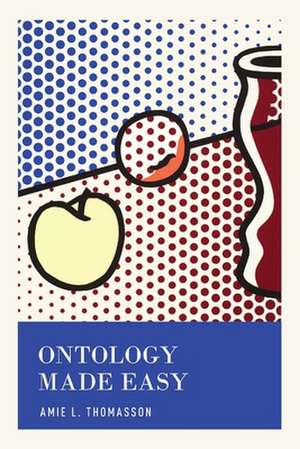Ontology Made Easy
Autor Amie Thomassonen Limba Engleză Paperback – 26 apr 2018
Preț: 256.55 lei
Preț vechi: 297.75 lei
-14% Nou
Puncte Express: 385
Preț estimativ în valută:
49.10€ • 50.97$ • 40.94£
49.10€ • 50.97$ • 40.94£
Carte tipărită la comandă
Livrare economică 13-19 martie
Preluare comenzi: 021 569.72.76
Specificații
ISBN-13: 9780190878665
ISBN-10: 0190878665
Pagini: 362
Dimensiuni: 208 x 140 x 23 mm
Greutate: 0.41 kg
Editura: Oxford University Press
Colecția OUP USA
Locul publicării:New York, United States
ISBN-10: 0190878665
Pagini: 362
Dimensiuni: 208 x 140 x 23 mm
Greutate: 0.41 kg
Editura: Oxford University Press
Colecția OUP USA
Locul publicării:New York, United States
Recenzii
Ontology Made Easy is an original and thought-provoking book, which will probably appeal to all those philosophers who, like the author of these lines, for a long time have been looking for a more modest and fruitful way of doing analytic ontology.
This important book offers an interpretation and defence of the neo-Carnapian deflationist view of ontology - a view which, as Thomasson persuasively argues, has been widely misunderstood. It fills a significant gap in the literature, and does so with Thomasson's characteristic thoroughness, insight and clarity.
The book's chief virtue lies in how methodically and artfully it collates and re-evaluates the criticisms that have kept easy approaches to ontology at bay for the past fifty years. Thomasson ingeniously defends the view against a variety of challenges, including the charge that the approach is implicitly circular in its reasoning and the accusation that easy approaches to ontology render the question of what exists implausibly dependent on human activity.
Ontology Made Easy has many virtues. It is thoroughly conversant with the best and most influential current work in ontology, and Thomasson situates her positions and arguments within cutting-edge work very well. Thomasson's writing is admirably clear and uncluttered. And her arguments and positions are consistently very sensible: Thomasson consistently avoids overly subtle technical distinctions or recondite formalism, whenever a more natural and intuitive way of expressing a point is available. So, if you wonder whether ''Empiricism, Semantics, and Ontology'' could withstand the scrutiny of modern-day metaphysicians, you should read Thomasson's book.
Amie L. Thomasson lays out in a lively and clear fashion her preferred view on ontological questions, traces it back to Rudolf Carnap, and compares and contrasts the view with many competing views from the literature...There is much else of value in the book...I happily recommend it to readers interested in ontological and metaontological debates. Thomasson lays out an interesting case for an important view on ontological questions. In the course of so doing she also provides an overview of alternative views, and sometimes, e.g. in the case of fictionalism, the remarks she makes about those views are significant in their own right.
This important book offers an interpretation and defence of the neo-Carnapian deflationist view of ontology - a view which, as Thomasson persuasively argues, has been widely misunderstood. It fills a significant gap in the literature, and does so with Thomasson's characteristic thoroughness, insight and clarity.
The book's chief virtue lies in how methodically and artfully it collates and re-evaluates the criticisms that have kept easy approaches to ontology at bay for the past fifty years. Thomasson ingeniously defends the view against a variety of challenges, including the charge that the approach is implicitly circular in its reasoning and the accusation that easy approaches to ontology render the question of what exists implausibly dependent on human activity.
Ontology Made Easy has many virtues. It is thoroughly conversant with the best and most influential current work in ontology, and Thomasson situates her positions and arguments within cutting-edge work very well. Thomasson's writing is admirably clear and uncluttered. And her arguments and positions are consistently very sensible: Thomasson consistently avoids overly subtle technical distinctions or recondite formalism, whenever a more natural and intuitive way of expressing a point is available. So, if you wonder whether ''Empiricism, Semantics, and Ontology'' could withstand the scrutiny of modern-day metaphysicians, you should read Thomasson's book.
Amie L. Thomasson lays out in a lively and clear fashion her preferred view on ontological questions, traces it back to Rudolf Carnap, and compares and contrasts the view with many competing views from the literature...There is much else of value in the book...I happily recommend it to readers interested in ontological and metaontological debates. Thomasson lays out an interesting case for an important view on ontological questions. In the course of so doing she also provides an overview of alternative views, and sometimes, e.g. in the case of fictionalism, the remarks she makes about those views are significant in their own right.
Notă biografică
Amie Thomasson is Professor of Philosophy and Cooper Fellow in the Department of Philosophy at the University of Miami. She is the author of Ordinary Objects and Fiction and Metaphysics, and co-editor (with David W. Smith) of Phenomenology and Philosophy of Mind. In addition, she has published more than 50 book chapters and articles on topics in metaphysics, metaontology, fiction, philosophy of mind and phenomenology, the philosophy of art, and social ontology.
